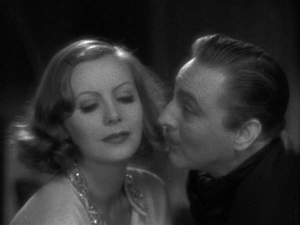In the 1932 film Grand Hotel nothing is more poignant than the themes of solitude and despair in life. People come, people go, nothing ever happens. Led by Lewis Stone, Lionel Barrymore, Wallace Beery, Joan Crawford, Greta Garbo, John Barrymore and Jean Hersholt; we glimpse into the lives of these characters and see their failures, frustrations and flaws. Produced by what Fortune Magazine called, “A floozie bag of bones held together by a furious ambition to make the greatest movies in the world,” Irving Thalberg assembled Vicki Baum’s story Grand Hotel and Edward Goulding directed the film tapping into each character’s lonely and disillusioned life.
Opening the film, the audience is told each character’s dilemma. As we are shown distinct conversations from a phone booth we are given insight into each person’s bubble of troubles. Throughout this the viewer can see the glamorous art deco setting of the beautiful Grand Hotel lobby with Joseph Strauss’ Blue Danube playing. The characters submerged in their problems in combination with the light-hearted music make a powerful contrast highlighting visually an emblematic world.
When Otto Kringelin, the terminally ill bookkeeper, reflecting on the fact that he is going to die says, “No, it isn’t nice to be told things like that. You plague, bother, and save, and all of a sudden your dead.” Working toward the dreams and hopes life could have offered him, while walking on reality, he struggles within himself to accept the fact of his soon-to-be death, needing to find out he was dying to live as he wanted. After he gambling with the Baron he says, “…for the first time in my life, I’ve tasted life! Life is very wonderful but it is very dangerous. If you have the courage to live it, it’s marvelous. You don’t know anything about that you’re all healthy and happy, but believe me if a man doesn’t know death he doesn’t know life.” Kringeline lacking courage to face the ups and downs of life and slowly diminished himself remaining content as a mistreated bookkeeper.
The Russian prima ballerina, Grusinskaya, is another character questioning life, achievement and failure. As she prepares for a ballet performance, her maid brings her pearls to which the disillusioned Grusinskaya responds, “The pearls are cold, everything is cold.” We later see her final desperate moments as she frantically begins to commit suicide. The charming thief Baron Von Driden who wants to steal her pearls, stops her and they begin a love affair. Only anothers love and warmth had led her to be happy; not money, success nor fame. It was Vicki Baum’s way of saying how much people need one another and how terrible that distant, longing feel when met by loneliness.
The character who anchors the film is the world-weary surgeon who was wounded in WWI. He scrutinizes people living up life in Berlin, which was at the time undergoing a decadent period where a high lifestyle was enjoyed. The doctor watched the rich and carefree crowd coming and going from the glamorous hotel noting their flaws and weaknesses. Having served in the war, his infected wound forced him into isolation for two years becoming cynical on the ways of life that surrounded him, questioning the meaning of life and the realities of it. He debates these ideas as he tells Kringelin, “What do you do in the Grand Hotel? Eat, sleep, loaf around, flirt a little, dance a little. A hundred doors leading to one hall. No one knows the person next to them. And when you leave, someone occupies your room, lies in your bed. That’s the end.” That statement is at the core of the stories message. At that point the film’s glitter and glamour is stripped away reminding us of their fates. As they ponder this in a bar they notice that in a crowded place no one cares to know anything about anyone else. Then when one dies the world keeps going on just the same and that’s the end. The doctor’s statement is a foreshadow as to what happens to Baron Von Driden.
When the Baron was murdered by Preysling, the ruthless German businessman, no one knew but the management of the hotel. Other than Flemmschen, the stenographer who lonely and poor compromises herself for money and comfort to Preysling. The Baron’s death came upon him by unsuccessfully stealing Preysling’s wallet in his last attempt to pay off his debts leading to his demise and ultimate death. After the police arrives, a moving scene shows the Baron’s corpse being removed from the hotel through the butcher’s shop at the service entrance, making the viewer question if there is such a notion as a useless life lived. Preysling is a complex character who was not intentionally an evil person but is the antagonist of the film, facing the law for murder. As the old crowd slowly disappears and disperses, the doctor watches a new crowd registering in the hotel and delivers the unforgettable line, “Grand Hotel. Always the same. People come, people go. Nothing ever happens,” and the Blue Danube plays until the end.
Grand Hotel philosophically centers on each character’s solitude being told through frustration and disillusionment, in the quest of living through life finding its meaning.







Great analysis of these beautiful classic movies.